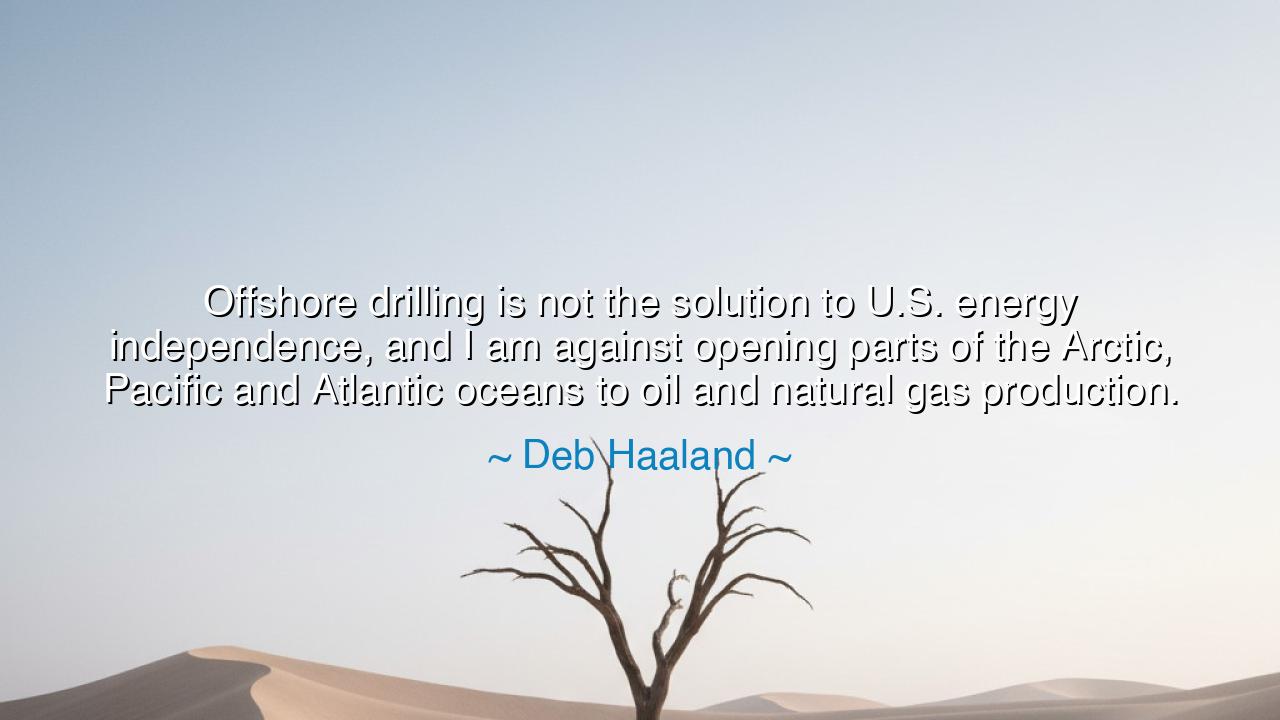
Offshore drilling is not the solution to U.S. energy
Offshore drilling is not the solution to U.S. energy independence, and I am against opening parts of the Arctic, Pacific and Atlantic oceans to oil and natural gas production.






The words of Deb Haaland, when she declared, “Offshore drilling is not the solution to U.S. energy independence, and I am against opening parts of the Arctic, Pacific and Atlantic oceans to oil and natural gas production,” rise like a solemn vow to the Earth itself — a vow of guardianship, of remembrance, of reverence for the ancient balance between humankind and nature. These are not words of politics, but of prophecy — the cry of one who sees that true independence is not found in the plundering of the earth’s depths, but in the wisdom to live in harmony with its gifts. It is a declaration that strength is not measured by the barrels we burn, but by the care with which we preserve the world that sustains us.
For centuries, humankind has sought dominion over nature — to carve the mountains, to pierce the seas, to draw from the earth its buried fire. The hunger for power, wealth, and fuel has driven nations to stretch their hands even into the frozen sanctuaries of the Arctic, where silence reigns and the breath of creation still lingers. Yet in her words, Haaland reminds us that the cost of such conquest is too great. For when the ocean bleeds, so too does the spirit of the earth; and when the ice melts, the balance of life trembles. Energy independence, she warns, cannot be built upon dependence on destruction.
In the wisdom of the ancients, the earth was never seen as a possession, but as a mother — Mother Earth, who nourishes all and demands reverence in return. The Native peoples of the Americas, from whom Haaland descends, have long understood this sacred covenant. They took only what they needed, and they gave thanks for what they took. The hunter prayed to the deer before the hunt, and the gatherer sang to the roots she pulled from the soil. For they knew that the earth is alive — that to wound it recklessly is to wound oneself. Haaland’s stance echoes this ancient truth: that stewardship, not conquest, is the path to survival.
Recall the tale of the Exxon Valdez in 1989 — when oil spilled across the waters of Alaska, darkening the waves and silencing the cries of birds. Thousands of otters, seals, and eagles perished. The sea, once a mirror of the heavens, became a grave. It took decades for life to return, and even now, the scars remain. That tragedy was not an accident of machinery, but of pride — the pride that believed progress could come without responsibility. It is to prevent such wounds that Haaland speaks, guarding not only the Arctic, but the soul of all who depend on it.
Yet her words carry not despair, but hope. For she does not speak only against, but for — for innovation, for renewable energy, for a vision of humanity that draws its power from the wind, the sun, and the unbreakable will of human ingenuity. She reminds us that independence means not clinging to the past, but forging a wiser future. The fire we need is not hidden beneath the sea, but within ourselves — the fire of invention, compassion, and foresight. When humanity turns from greed to gratitude, from extraction to restoration, then true freedom shall be found.
There is also a lesson here for every individual soul: the Earth’s story is our story. Each of us drills into our own reserves — of time, of strength, of heart — sometimes too deeply, until nothing remains. Haaland’s words, though spoken of oceans, are also a call to our inner lives: do not consume yourself to fuel the false fires of success. Seek sustainable living in all things — in work, in love, in the quiet stewardship of your days. For the Earth, like the spirit, thrives when tended with care, and perishes when exploited without thought.
So, O listener, take these words as both warning and invitation. Guard the oceans, for they are the lungs of the planet. Protect the ice, for it is the memory of the world. Choose paths of creation over consumption, of renewal over ruin. And when you speak of independence, remember that no person, no nation, and no species can stand alone — we are all bound by the breath of the same wind, the rhythm of the same tides, the fire of the same sun.
Thus, the teaching is eternal: that true power lies not in domination, but in harmony. Let us walk gently upon the earth, as children who remember the love of their mother. Let us build a future where the oceans remain blue, the skies remain clear, and the fires that light our homes never consume the heart of the world. For to honor the Earth is to honor life itself — and in that reverence, we shall find our truest independence.






AAdministratorAdministrator
Welcome, honored guests. Please leave a comment, we will respond soon